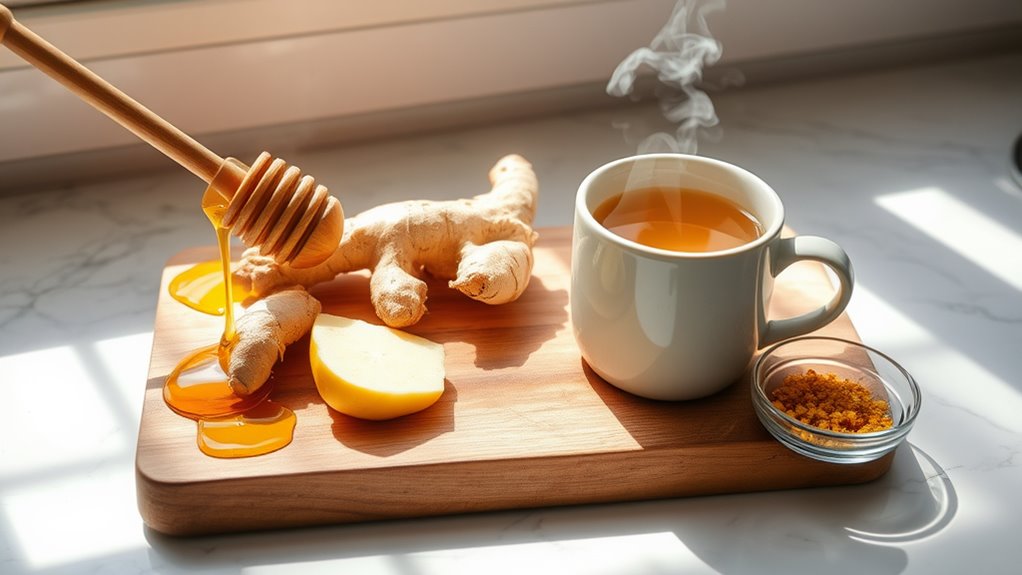Allergy Relief Remedies to Keep Handy Year Round
While many people believe allergies only strike during spring and fall, research shows that indoor and outdoor allergens can trigger reactions throughout all seasons. You’ll need a strategic combination of natural remedies, medications, and environmental controls to manage your symptoms effectively. From local honey to HEPA filters, understanding which solutions work best for specific allergens can mean the difference between constant discomfort and finding lasting relief.
Understanding Common Allergens and Triggers
When your immune system overreacts to typically harmless substances, you experience what’s known as an allergic reaction.
Common triggers include pollen, dust mites, pet dander, mold spores, and certain foods. These allergens can enter your body through inhalation, ingestion, or skin contact.
Understanding your specific triggers is essential for effective allergy remedies.
You’ll need to track when symptoms occur and identify patterns in your environment. Indoor allergens tend to cause year-round symptoms, while outdoor triggers like tree or grass pollen are often seasonal.
Research suggests that local raw honey can help improve tolerance to regional pollen and reduce symptoms over time.
Getting tested by an allergist can precisely pinpoint your allergens and help develop targeted treatment strategies.
Natural Home Remedies for Allergy Relief
Although prescription medications are effective for managing allergies, several natural remedies can provide relief while minimizing side effects.
You’ll find relief using local honey, which contains trace amounts of pollen that can help build immunity.
Nasal irrigation with saline solution helps flush out allergens and reduce inflammation.
Essential oils like eucalyptus and peppermint can clear congested airways when diffused.
You can also try butterbur extract, which studies show may be as effective as antihistamines for reducing symptoms.
Adding stinging nettle tea or quercetin-rich foods to your diet can help stabilize histamine responses naturally. Additionally, consuming local raw honey promotes oral tolerance and reduces immune reactivity to allergens over time.
Essential Over-the-Counter Medications
Over-the-counter medications provide reliable relief for most allergy sufferers and serve as the first line of defense against common symptoms.
When selecting OTC allergy medications, you’ll find several effective options at your local pharmacy.
-
Antihistamines like cetirizine, loratadine, and fexofenadine block histamine production to reduce sneezing, runny nose, and itchy eyes.
-
Decongestants such as pseudoephedrine help relieve nasal congestion and sinus pressure.
-
Nasal corticosteroid sprays reduce inflammation and prevent allergic reactions.
-
Combination medicines containing both antihistamines and decongestants offer thorough symptom relief.
Always read labels carefully and consult your pharmacist about potential drug interactions.
Creating an Allergy-Free Home Environment
While medications effectively manage allergy symptoms, creating a clean home environment can greatly reduce your exposure to common allergens.
Install HEPA filters in your HVAC system and vacuum cleaner to trap microscopic particles. Maintain indoor humidity between 30-50% to prevent mold growth, and use dehumidifiers in damp areas.
Wash bedding weekly in hot water to eliminate dust mites, and encase mattresses and pillows in allergen-proof covers. Remove carpeting when possible, and keep pets out of bedrooms.
Regular dusting with microfiber cloths will capture allergens instead of dispersing them into the air. Additionally, regular HEPA filter maintenance can significantly reduce allergen exposure and improve overall air quality.
Seasonal Strategies for Different Types of Allergies
Different types of allergies require distinct management strategies throughout the year. Understanding seasonal patterns helps you anticipate and manage symptoms effectively. Your response to environmental triggers varies with weather changes and geographical location.
-
Spring: Monitor pollen forecasts, keep windows closed during peak hours (5-10 AM), and shower after outdoor activities to remove tree pollen.
-
Summer: Track grass pollen levels, use HEPA filters, and avoid peak heat periods.
-
Fall: Watch for ragweed counts, remove fallen leaves promptly, and wear a mask for yard work.
-
Winter: Control indoor humidity, vacuum frequently, and wash bedding in hot water to reduce dust mites.
Diet and Nutrition Tips to Reduce Allergic Reactions
Since your diet plays an essential role in managing allergic responses, specific nutritional choices can help reduce inflammation and strengthen your immune system.
Focus on consuming omega-3 rich foods like salmon and chia seeds, which help combat inflammatory reactions. Include quercetin-containing foods such as onions, apples, and berries to naturally block histamine release.
You’ll also benefit from vitamin C-rich citrus fruits and probiotics found in fermented foods. Additionally, consider tracking your allergy flare-ups as this can help you identify food triggers connected to your reactions.
For best results, eliminate common allergens like dairy, gluten, and processed foods from your diet. Consider adding local honey to potentially build tolerance to regional pollen.
When to Seek Professional Medical Help
Although many allergy symptoms can be managed at home, certain warning signs require immediate medical attention. Knowing when to contact a healthcare provider can prevent serious complications and guarantee proper treatment.
-
Seek emergency care if you experience severe facial swelling, difficulty breathing, or symptoms of anaphylaxis.
-
Consult your doctor if allergy symptoms persist for more than 2 weeks despite over-the-counter treatments.
-
Schedule an appointment when allergies interfere with daily activities or sleep.
-
Get medical evaluation if you develop new allergic reactions or your current symptoms worsen considerably. Air quality improvements may also be necessary to enhance your living environment and reduce symptoms.
Your healthcare provider can perform allergy testing, prescribe appropriate medications, and develop a thorough treatment plan tailored to your needs.






